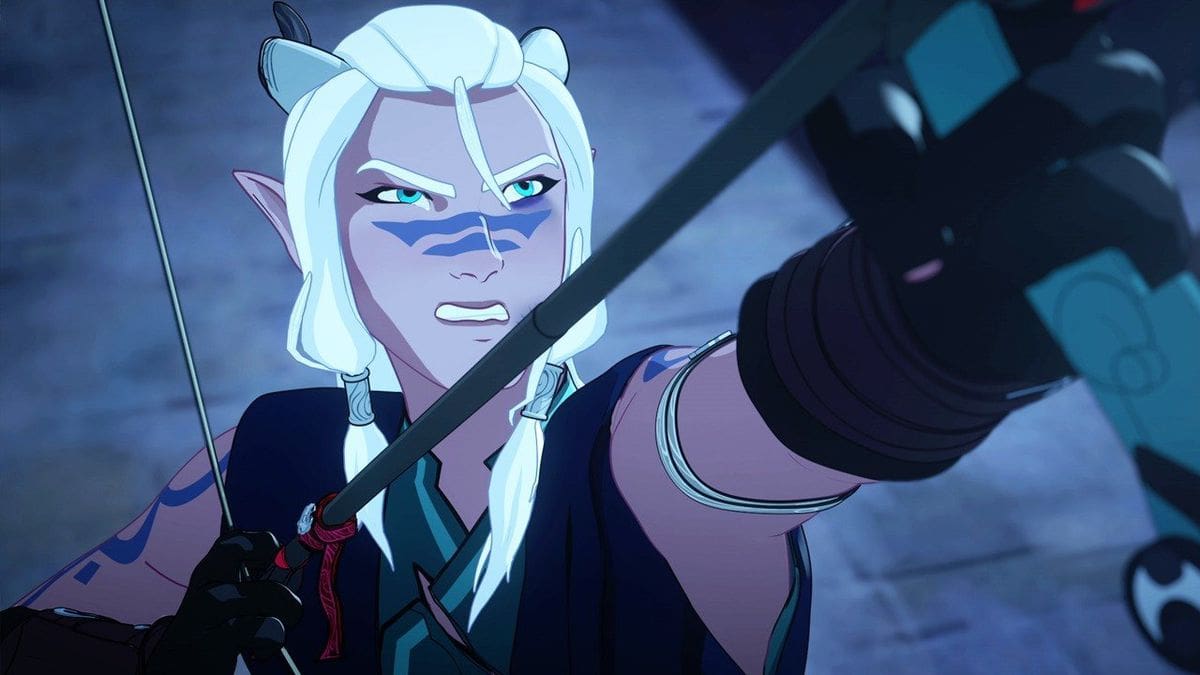I should have known, being a lifelong fan of Avatar: The Last Airbender, that another animated fantasy adventure series by Aaron Ehasz and starring Jack de Sena about a group of unlikely young adult heroes on a quest to save the world would have me hooked in an instant.
But I truly forgot the extent of Ehasz’s storytelling talent in the decade since Airbender ended. Because it would seem he not only remembered what made Airbender iconic in its time, he has also gotten more adventurous in his craft giving The Dragon Prince the potential to be his best work yet. And now here I am, waiting for word of a second season that is at minimum a year away.
The Dragon Prince was nearly impossible for me to put down, even as my body begged for sleep at two in the morning. It did take a couple episodes before I could confidently grasp the rules and major components that make up Ehasz’s magical world. But it is never overwhelming in its world building as the audience is gradually informed of the composition of the world through the various characters’ organically-introduced shortcomings in the expectations of the social hierarchies in which they participate.
The art style is brand new and gorgeous, particularly in the battle scenes, though the animation does unfortunately suffer as though it is missing key frames in ordinary motion beats. Returning fans can definitely sense the series’ Avatar roots, like the fact that the story follows adolescents trying to end a war that began before they were even born as a metaphor for entering adulthood, but it differentiates itself enough that any recollection or reminiscing of Aang and his friends only makes for a welcome foothold in understanding the intricately complex realms of Katolis and Xadia.
But where The Dragon Prince truly shines is in its character writing. The characters are the audience’s entry point into the world, but every one of them is incredibly fleshed out. The primary protagonist is Callum, human step-son of King Harrow and elder half-brother to Ezran, the youthful, happy heir to the throne. Just the few scenes between Callum and his stepfather exploring their relationship and dynamic makes Cal one of the most complex animated protagonists in years. But joining the brothers is Rayla – a Moonshadow elf assassin and moral compass of the trio by default. Her arc over the season is fascinating because she finds comfort in her unlikely new friends after failing at her mission as an assassin, but carries a terrible burden and incredible choice along with it that makes her entire character beautifully layered in tragedy and courage.
On the opposite side is Viren and his children Claudia and Soren. Soren is captain of the guard and Claudia follows in her father’s footsteps as a mage. The siblings are definitely the least complex characters of the inaugural season and mainly function as comic relief, but they still manage to have their own distinct personalities as well as their own needs and wants as servants of the realm. Their lack of depth is hardly even felt because there is so much time dedicated to the more important principal cast. However, the final three episodes introduce some very engaging developments and indicate that their arcs are certain to take some fascinating and defining turns once new episodes release.
But Viren is truly something special. He is undoubtedly the series’ primary antagonist and his monstrous actions reflect as such. But his motivations are strikingly noble. He seeks the power and influence of the throne and goes to ghastly means, both magical and mundane, to achieve it. But his desire is only to provide protection and preservation of his country at war that Ezran never could.
In the defining moment of his character for the season, he puts his belief in his king before his own self-preservation before it is thrown back in his face. Despite being the primary antagonist and staunch proponent of dark magic, Viren comes from a place of pure intention and we cannot help but understand his motivations, even if we disagree with them. This is the mark of great villain writing, and I cannot wait to see what comes of Viren in season 2, if he is corrupted beyond hope of return or if he can perhaps be redeemed.
Avatar provided a strong first season before delving deep into characters and expanding the world exponentially beyond what viewers initially saw. The Dragon Prince looks to be doing the same. The story surrounding each of our characters is fascinating, but it comes at the expense of sidelining the non-plot critical civilians populating its expansive world.
In many ways the series brings to mind the setting and lore of Game of Thrones, but most visibly in the loosely-connected scenes that zero in on principal heroes and villains and neglect the common people for whom they fight. Hopefully this can be fixed in the coming season, as it has become a tiresome and irritating trope for expansive world building fiction to overlook.
Only in its primary three episodes The Dragon Prince does so much right by its story and character writing that it provides more than enough reason to stick around and see how its story is to play out. But it is additionally so forward-thinking and progressive in its themes and characters the more the series goes on (like in the way it casually introduces one of Katolis’ most respected generals who happens to be completely deaf), that it makes the series a quiet sleeper hit in a year already with so much great TV, animation included.
This is a great season of television that lives up to the expectations inherent in being so closely tied to Avatar. Aaron Ehasz has delivered another winner of an epic children’s fantasy series that anyone who misses the airbender should be happy to sink their teeth into.
Overall rating: 8/10


